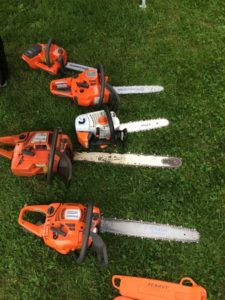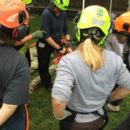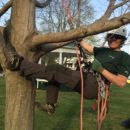Curious adults — with enough time and money — have seemingly endless opportunities to gain new skills every day. In the Berkshires, a small group gathered for a class on chainsaws offered by the Trustees of Reservations — specifically for women.
Instructor and arborist Melissa LeVangie knows from her own experience in the trees in the Northeast that women are well in the minority when it comes to using chainsaws.
We are so minuscule, in terms of a large population of who uses this tool,” LeVangie said. “It’s sad but true. “

Even preparing a PowerPoint presentation for the class, LeVangie had a hard time finding appropriate pictures.
Chainsaws, and their users, have changed. New chainsaws have technology and safety features that helped reassure many of the women in the class.
“[There are] some kinds of equipment I’m perfectly comfortable with, but chainsaws — I had little to no experience with them,” said Carol Terry of Lee, Massachusetts..
“When I would watch other people with chainsaws, someone would say, ‘This is the way that I do it,’ and someone else would say, ‘Well, this is the way that I do it,'” said Liz Allen of Caanan, Connecticut. “And I wanted to learn the right way, so that I wouldn’t get any bad habits or have any accidents.”
One universal frustration that women and men all have to overcome? Starting the chainsaw. At the class, there was lots of laughing, and a joke that maybe an electric chainsaw would be the better option.
Ana Maria Spagna wishes there was a class like that when she got started. She knows a thing or two about chainsaws. Spagna, who wrote an essay for the book “From Curlers to Chainsaws: Women and Their Machines,” used a chainsaw as a trail crew member for the National Park Service in the Northern Cascades in Washington state.
Spagna said that over her fifteen years operating chainsaws, gender wasn’t usually a big deal for her.
“When I would go to the shop to pick up parts, the guys at the shop would be sort of delighted to have a young woman come in who obviously knew the tool and knew how to speak the language,” she said. “And — on occasion — they’d even say things like, ‘We wish more gals would come in.'”
In her essay, Spagna wrote about her relationship with her chainsaw — and how it’s a hard tool for both women and men:
Even if you’ve never run a saw, you can hear when someone is forcing the issue, fighting the wood, revving past the time for an undercut. The grain is tightening and the sawyer doesn’t know enough, or is not paying enough attention, to pull out the bar and saw upwards to meet the downward cut. It’s rare to cut in only only direction and make it work.”
“There’s an awful lot about running a chainsaw that can be a metaphor for life,” Spagna said.

Months after the chainsaw class in the Berkshires, Pam Rooney of Amherst, Massachusetts, said her skills have come in handy.
“When my neighbor’s limb broke off…we were able to go clean it up for her. And [we] also brought into service our wood splitter to help a neighbor and we spent an afternoon splitting up wood for them,” Rooney said. “We’ll keep the skills sharpened and the saws sharpened.”
Rooney and her husband also own land in Southern New Hampshire covered in beech, maple, hemlock and oak trees. That’s where, she said, she does her more serious chainsawing.




